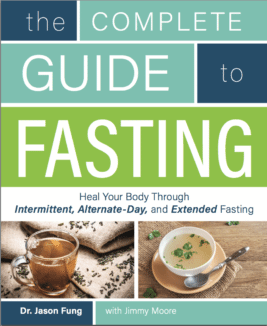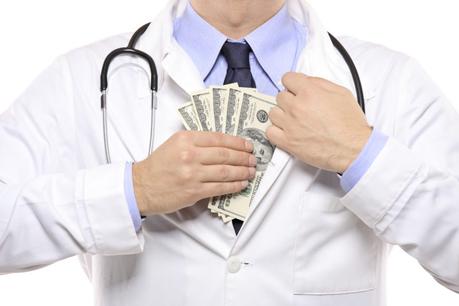
Clinical guidelines are theoretically very useful, gathering leading experts to help front-line clinicians care for patients. Experts often spend decades doing research into a single clinical problem. Clinicians, on the other hand deal with a multitude of problems. A general practitioner may deal with cancer, heart disease, and obstetrical problems all in the space of one hour. So guidelines should serve to document 'best practices' and become a standard of care. Good guidelines identify and disseminate the most scientifically sound advice available.
Thus it is extremely important to monitor the integrity of the guidelines. Financial conflicts of interest (COI) among authors and sponsors of guidelines have the potential to turn these guidelines into nothing more than marketing tools for drugs and other devices.
It is already well known these financial COI are extremely common among doctors and considered both widespread and acceptable. Biased guidelines harm patients by exposing them to medications unnecessarily, and puts other physicians in a dilemma, because they may be accused of falling short of the standard of care if they do not follow accepted guidelines.
Conflicts of interest
Many authors have suggested the rather common sense precaution that doctors that write guidelines have no financial COI. This way, we can be sure that they are truly representing the scientific ideal of medicine. The public deserves no less. The problem with evidence based medicine already exists that virtually all good 'evidence' is written by Big Pharma. Negative studies tend to be neglected, and positive studies are strongly emphasized and widely disseminated. Thus, it is especially important to take steps to ensure that the 'best evidence' remains free of financial COI.
There are many ways that Big Pharma pays doctors. The more prominent the status of a doctor, the more likely he/she has been paid off. The most common are speaker's fees and consulting fees. In the former, a pharmacy company will pay a doctor to deliver a canned talk (one that is written almost entirely by the pharmaceutical company) to an audience of other physicians. It is purely advertising, for which the doctor is usually paid $1,500 - $2,000. Not bad for an hour's work, considering that he/she did not have to think about the lecture, write the slides or even know what needed to be said.
The second form of graft is consulting fees. The company will pay the doctor for his/her 'advice' as a consultant on how to market a drug. Of course, the company cares not at all about what he/she says. It is an opportunity to give these doctors a 2-hour advertisement disguised as a consultation. For this the doctor is paid $2,000-$5,000. It is no different than those free tickets you can get for sitting through some high-pressure sales pitch from the time-share company near Orlando. But doctors love these, because they are lucrative, and they get to listen to some drug rep tell them over and over how smart they are, and how influential. Flattery will get you everywhere.
The impact of research money
The most insidious form of corruption is 'research' money. While it sounds great, it is usually another thinly disguised form of bribery. Some research project is usually set up with little or no academic merit. The universities setting this up are well paid. The doctors who participate are well paid. Best of all, research meetings are held regularly in lovely locations like Vienna and Hawaii. 'Researchers', of course, are invited to participate, all expenses paid. The public only sees that the company has donated 'research' money and that the doctor is doing 'research'.
These shenanigans happen every day, in every university. If you've ever wondered why there is so much money being raised for heart disease or cancer or diabetes, and why there is so little real medical progress - this is the reason. It is estimated that 80% of research studies are cited less than 10 times. That is the number of times another researcher had read the research and thought it was important enough to reference it. Less than 10 times means that only the authors themselves had even bothered to read it.
Because of the extraordinary power of guidelines from national organizations (American Heart Association or National Comprehensive Cancer Network, for example) to influence the practice of medicine, it is important that these guidelines be free of financial COI. For example, imagine your local school board and trustees. Imagine that the chair of the committee is also a paid consultant to a marijuana company. Now the school comes out that says that 'Smoking weed is not really that bad for you. In fact, you should smoke more because it makes you good-looking and smart'. Would that be acceptable?
Imagine that your local neighbourhood planning office was led by a man who was receiving kickbacks from drug dealers. Now a dictum comes out that 'Crack houses, grow ops and protection of dealers are great! Let's get some more'. Would that be acceptable? We have names for this kind of behaviour. Kickbacks, bribes, corruption, graft. In medicine, we call it 'acceptable, widespread and welcomed'.
In both cases, there is a clear financial conflict of interest, and both cases are completely unacceptable because committee members have a fiduciary duty to protect the interests of its group, and must be free of financial COI. Doctors also have a fiduciary duty to protect the public health, but it seems that nobody takes this COI very seriously.
A survey found that 71% of clinical policy committee chairs and 91% of committee co-chairs had financial COI! Since these leaders determine who sits on the committee it is no surprise that "what is to be decided (by committees producing guidelines) is often already decided by with the selection of the deciders". That is, if you stack the committee with people who love drug treatments, then the guideline will reflect this, even if the individual committee members are not complicit. Converting raw data into clinical recommendations requires the use of subjective judgement, so it is vital that people are unbiased.
The Institute of Medicine has clear policy guidelines and the article states that we have had "Two more decades of little, if any, progress". That's a clear condemnation of the failure of doctors to police themselves. Academic physicians cannot help but gorge themselves on the fountain of blood money coming from pharmaceuticals. They help write guidelines to promote big money drugs, lining their own pockets with ill-gained lucre. Even when clear guidelines exist for the creation of committees, they willfully flout these guidelines because they are not enforced, and it exists in a culture of denial.
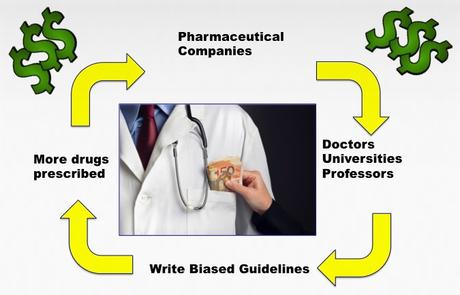
As of 2011, 130 guidelines were reviewed to see how many complied with 18 of 25 Institute of Medicine standards. We're not looking for perfection here. The median number of IOM standards (out of 18) was only 8. That's 44.4%. An 'F' grade for sure. Most guidelines written today are not worth the paper they're written on.
The guidelines influence the treatment patients receive
Much evidence exists that financial COI influences doctors' perceptions about medications. That's no surprise. Doctors are human and as prone to advertising as anybody else. But doctors do not acknowledge that these financial COI plays any role in their medical decision making, when it is obvious and well proven that this is true. Good evidence exists that guidelines play a key role in promoting MORE care, but not BETTER care. Guidelines are better thought of as marketing materials rather than road maps to improved medical care. This stems directly from the root corruption of the people writing these tainted reports that now guide all of clinical medicine.
Compared to 1999, that last time a thorough survey was done, there has been no improvement in the quality of guidelines writing. There has been no reduction in corruption over the last 20 years, and there certainly is nobody in medicine pushing for more accountability. Why? Those that can push, are all on the take. Journals, universities, professors, doctors - all paid by pharmaceutical companies. It's a complete travesty. Doctors make a very good living being doctors. Accepting tainted cash is not acceptable. Pharmaceutical companies exist to make drugs and sell them. They have no conflict of interest. Their interests are plain and obvious for all to see. No, it's the doctors that accept this money that need to reform.
Let's look at some specific examples.
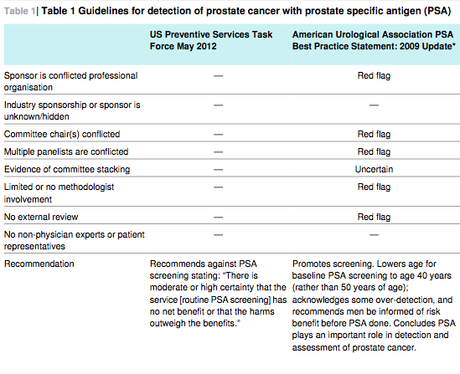
The US Preventative Services Task Force determined that a blood test, PSA was NOT useful in the early detection of prostate cancer. Compare this to the American Urological Association, whose guidelines were chock full of conflicts of interest, which promotes screening.
This increased screening would mean more work for urologists, whose members make up the AUA and this whole thing means more $$$.
In another example, the National Cholesterol Education Program (NCEP) cholesterol guidelines update in 2004 considered three studies on primary prevention published since the 2001 update.
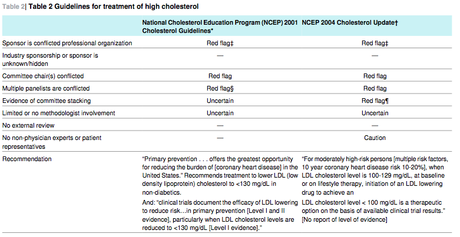
The ALLHAT study showed no benefits to statin medications in primary prevention. The PROSPER study showed that elderly people (>70 years) without evidence of disease showed no benefits from statins. The ASCOT study showed no benefit in primary prevention in women. Yet still, the NCEP 2004 update greatly expanded the indication for statin treatment. WTF??? All becomes clear when looking at who wrote the biased guidelines. It appears that when companies pay doctors a lot of $$$, they write nice things about who should be given drugs, making more $$$ for the company. In 2001, all 14 of the committee members had financial COI. In 2004, 8 of 9 (89%) of members had COI. Nice... For doctors and big Pharma, it's a win-win situation. Doctors make more money, Big Pharma makes more money. Who loses? Everybody else. More patients take more drugs that don't make them healthier, but expose them unnecessarily to side effects.
A last example comes from the use of anti-depressant medications.
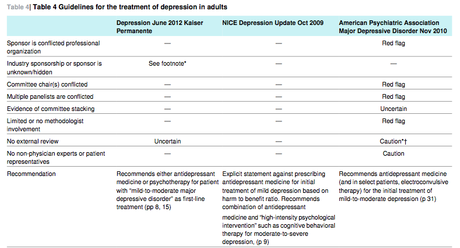
Once again, we note that the NICE guidelines, which contains no red flags for COI, explicitly recommends AGAINST antidepressant medications. On the other hand, the American Psychiatric Association, which was in 2010 estimated to get $14 million in funding from drug companies, LOVES antidepressant medications and thinks they should be distributed like Halloween candy. Your mother died - you need drugs! Your dog is sick - you need drugs! You have marital problems - you need drugs!
The reason there is so little public trust in doctors is really quite simple. We're not that trustworthy.
The reason there is so little public trust in doctors is really quite simple. We're not that trustworthy. A few bad apples are destroying our reputation. It's time to end the graft.The solution is very simple. If you write a guideline - neither your organization nor any individuals should be taking drug money. This is already true in virtually every other sphere of public service.
We don't allow politicians to take kickbacks. We don't allow government employees to take kickbacks. We don't allow school boards to take kickbacks. Why allow doctors, universities and professors?
Do you want to read more by Dr. Fung? Here are his most popular posts:
More with Dr. Fung
All posts by Dr. FungDr. Fung has his own blog at idmprogram.com. He is also active on Twitter.
His book The Obesity Code is available on Amazon.
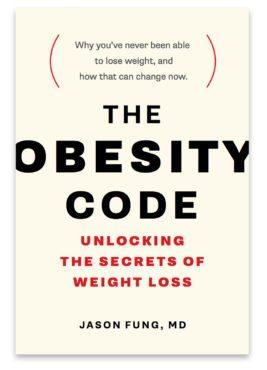
His new book, The Complete Guide to Fasting is also available on Amazon.
